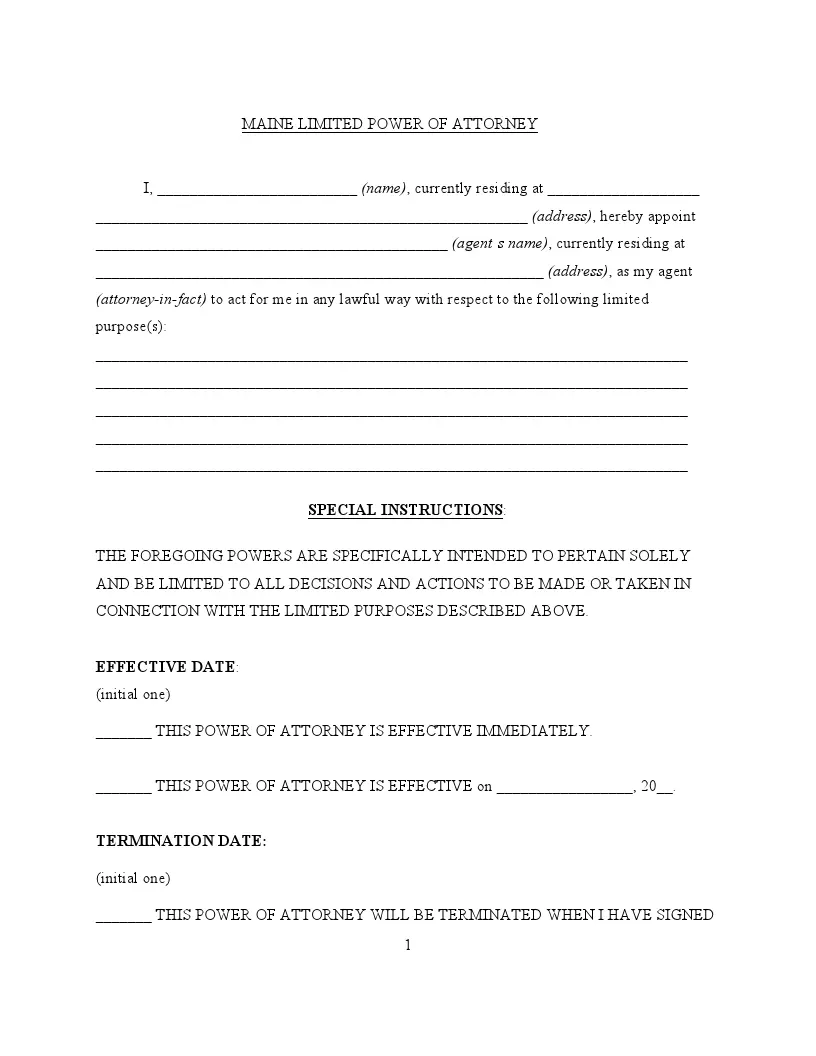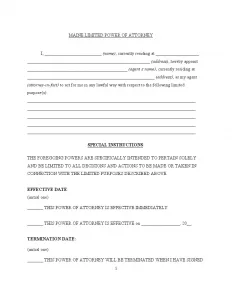Maine Limited Power of Attorney Form
The Maine limited power of attorney is a legal document that allows an individual (the principal) to designate another person (the agent) to act on their behalf in specific matters or situations. Unlike a general option that grants broad powers, a limited power of attorney restricts the agent’s authority to certain activities or for a set period.
For example, you might use a limited power of attorney to give someone the authority to handle real estate transactions, manage financial accounts, or make medical decisions only during a specified time or while you cannot do this due to travel or illness. This form of power of attorney provides a way to manage specific tasks without handing over complete control of all legal or financial matters.
In Maine, the document must clearly state the limitations and include the powers granted, as well as their beginning and ending. Check out all Maine power of attorney forms if you need to designate an agent for vehicle transactions or medical decisions.

Build Your Document
Answer a few simple questions to make your document in minutes
Save and Print
Save progress and finish on any device, download and print anytime
Sign and Use
Your valid, lawyer-approved document is ready
Title 18-C, Article 5, Part 9 of the Maine Revised Statutes details the legal framework for creating and executing a limited power of attorney. This statute outlines the requirements and laws to ensure that a power of attorney is valid and enforceable.
A “power of attorney” in Maine is defined as any writing that allows an agent to act on behalf of the principal. The term need not explicitly be “power of attorney” for the document to be considered as such under § 5-902 of the Maine Revised Statutes.
To legally execute a limited power of attorney, specific signing requirements must be met:
- The principal must sign the document.
- The signature must be acknowledged before a notary public (§ 5-905).
Under Maine law, once these conditions are satisfied, the agent can act within the scope explicitly outlined in the power of attorney. It can include handling financial matters, selling property, or making healthcare decisions, as specified in the document.
Maine Limited Power of Attorney Form Details
| Document Name | Maine Limited Power of Attorney Form |
| Other Name | Maine Special Power of Attorney |
| Relevant Laws | Maine Revised Statutes, Title 18-C, Section 5-931 |
| Avg. Time to Fill Out | 8 minutes |
| # of Fillable Fields | 32 |
| Available Formats | Adobe PDF |
Filling Out Maine Limited POA
When you need to authorize someone to act on your behalf in Maine for specific tasks or decisions, a limited power of attorney form is the appropriate legal tool. Below is a step-by-step guide on filling out this form correctly to ensure it meets legal standards and accurately reflects your intentions.
1. Enter Principal and Agent Information
Fill in your full name and residential address at the top of the form where indicated. Next, provide the name and address of the person you are appointing as your agent. Ensure all information is accurate and complete to avoid any issues with recognition and enforcement.
2. Define the Powers Granted
Specify the powers you are granting to your agent. Be as detailed as possible to clearly outline what the agent is allowed and not allowed to do on your behalf. This clarity helps prevent misuse of the power and confusion in its execution.
3. Set the Effective and Termination Dates
Choose when the power of attorney will begin and end. You can opt for it to take effect immediately or commence on a specified date. Similarly, decide if it will terminate on a particular date, upon signing a written revocation, or if you are determined to be incapacitated.
4. Appoint a Successor Attorney-in-Fact
If there is a possibility that your initial agent might not be able to serve, appoint a successor attorney-in-fact by providing their name and address. This step ensures continuity in managing your affairs without interruption.
5. Sign and Date the Document
After reviewing the form to ensure all information is correct and reflects your wishes, sign the document in the presence of a notary public. Include the date of signing to validate the form.
6. Notarization
The last page of the form contains an acknowledgment section that a notary public will fill out after verifying your identity and witnessing your signature. This step legally acknowledges the execution of the power of attorney.
7. Distribute Copies
Provide a copy of the fully executed document to your agent, successor agents, and institutions or individuals that may require it, such as banks or medical facilities. Keep the original in a safe but accessible place.
